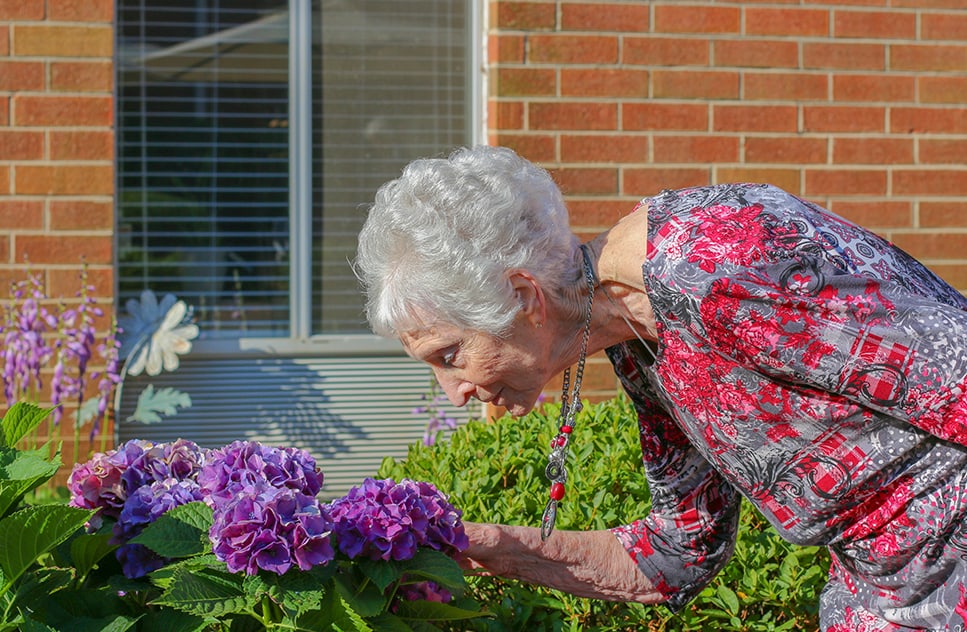Caring for an aging parent is a rewarding role with many responsibilities. Transitioning your loved one into an environment that fulfills their emotional and physical needs is an important aspect of caregiving.
Long-term care communities differ vastly from the nursing home stereotype. Nonetheless, change of any kind can feel overwhelming at first.
To help find peace in this transition, it’s helpful to:
- Educate yourself about the benefits of assisted living communities.
- Communicate openly with your parent and involve them in the decision-making process.
- Seek support from friends or family who have experienced a similar transition.
- Focus on the positives of professional care.
All About Assisted Living
Assisted living is a long-term care option for older adults who are relatively independent and don’t require intensive medical care, but who may need help with daily activities.
It offers a healthy balance of independence and support in a community-based environment, making it an attractive option for potential residents and their families.
Residents in assisted living are usually mobile and self-sufficient but benefit from the support provided by our professional care staff to complete daily tasks like personal grooming, meal preparation, and medication management.
Benefits of Moving to a Senior Living Community
In assisted living residents can find services and amenities designed to alleviate everyday stressors, including:
- Culinary experience: Nutritious meals are prepared and served, accommodating dietary preferences and restrictions to confirm residents receive balanced diets.
- Weekly housekeeping: Regular cleaning and laundry are provided to keep living spaces tidy and comfortable.
- Transportation: Scheduled transportation is available for medical appointments, shopping, and recreational outings, promoting easy access to the community and beyond.
- Social activities: A wide range of activities, including games, fitness classes, and cultural events, are organized to keep residents engaged and socially active.
- Ongoing medical support: We offer 24/7 onsite nursing support who are ready to assist with medical needs promptly and efficiently.
- Personalized apartments: Residents are free to decorate their suites and add some personal flair to their space.
- Support with daily activities: Professional care staff are available to support resident’s needs while promoting independence.
These perks allow residents to take a step back from everyday responsibilities and focus their time and energy on maintaining and fostering friendships through planned events, social outings, hobbies, and clubs!
How Assisted Living Supports Families
Transitioning a parent to a long-term care community can sometimes be an emotional journey. It’s completely normal to feel a mix of anxiety, guilt, and sadness.
Recognize that these feelings are valid and you’re not alone in experiencing them. Many people go through similar emotions, so give yourself grace during this time.
To help find peace in this transition, here are some helpful suggestions to remind you of how assisted living communities benefit the overall well-being of loved ones, and as a result, their families as well:
- Educate yourself: Understanding the benefits of assisted living and the specific services your parent will receive can alleviate some fears and anxieties. Knowing they will be in a safe, supportive, and community-driven environment with ongoing access to professional care when needed helps provide peace of mind.
- Communicate openly: Have honest discussions with your parent about the move. Listening to their concerns and involving them in the decision-making process fosters a sense of partnership and autonomy for your parent, reducing feelings of uncertainty for both parties.
- Seek support: Reach out to friends, family, or support groups to share your experience. Speaking with others who have gone through similar transitions can provide comfort, and insights, and reduce feelings of isolation or guilt.
- Focus on the positive: Remind yourself of the positive outcomes of the move; enhanced safety, social opportunities, and professional care, which can improve your parent’s quality of life.
Staying Connected in Assisted Living
One of the concerns we commonly see among families is their worry about being physically distanced from their loved ones. Fortunately, one of the many perks of living in such a digital age is how easy it is to connect with those we love.
Staying connected with your parent helps alleviate any feelings of guilt associated with transitioning to a long-term care community. Seeing them thrive and hearing about their experiences can reassure you that you’ve made the right decision.
While regular visits and communication can help them adjust to this transition, it’s important not to overdo it so as not to overwhelm your parent at first. Allowing them time to acclimate encourages independence and helps them integrate into the community at their own pace.
To maintain a healthy connection, prioritize quality over quantity. Schedule regular visits, calls, or video chats that align with your loved one’s schedule thereby respecting their new routine. This reassures them of your love and support, promoting their mental wellness.
Many assisted living communities encourage family involvement within their communities. Becoming involved in activities and events hosted by the community, can also strengthen your bond, and allow you to observe how comfortable and happy your loved one feels in this environment.
Remember, the goal of staying connected is to confirm your loved ones happiness, health, and strengthen your relationship, rather than keeping a constant presence.
Schedule a Tour
The decision to transition your loved one into a long-term care community, like assisted living, requires open communication between you and your parent, for a balanced approach.
By understanding the level of care and support that assisted living provides, together with your loved one, you can make an informed choice that prioritizes their overall health and well-being.
Connect with our team at Kingston Residence of Hickory to schedule a tour of our assisted living community.






